Sheffield voices: We need higher incomes and more for young people
Welcome to the first of our new Neighbourhood Voices stories, featuring people in north Sheffield.
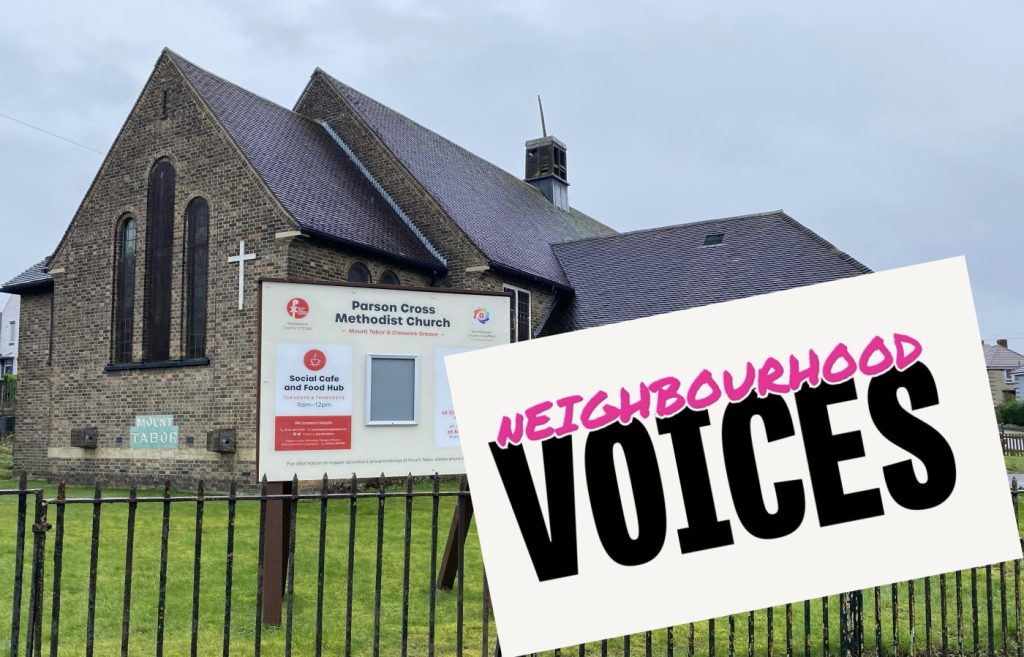
We’re at Parson Cross in Sheffield, on a Tuesday morning.
Mt Tabor Methodist Church opens its doors to the community most days of the week, providing food, friendship and warmth.
Tuesday in particular is a food-focused day. There’s a social cafe, a light lunch, and an evening meal, and people who need some bits and bobs to take away can do so.
Regulars and volunteers know the community inside out, and know what has changed – and what needs to change.
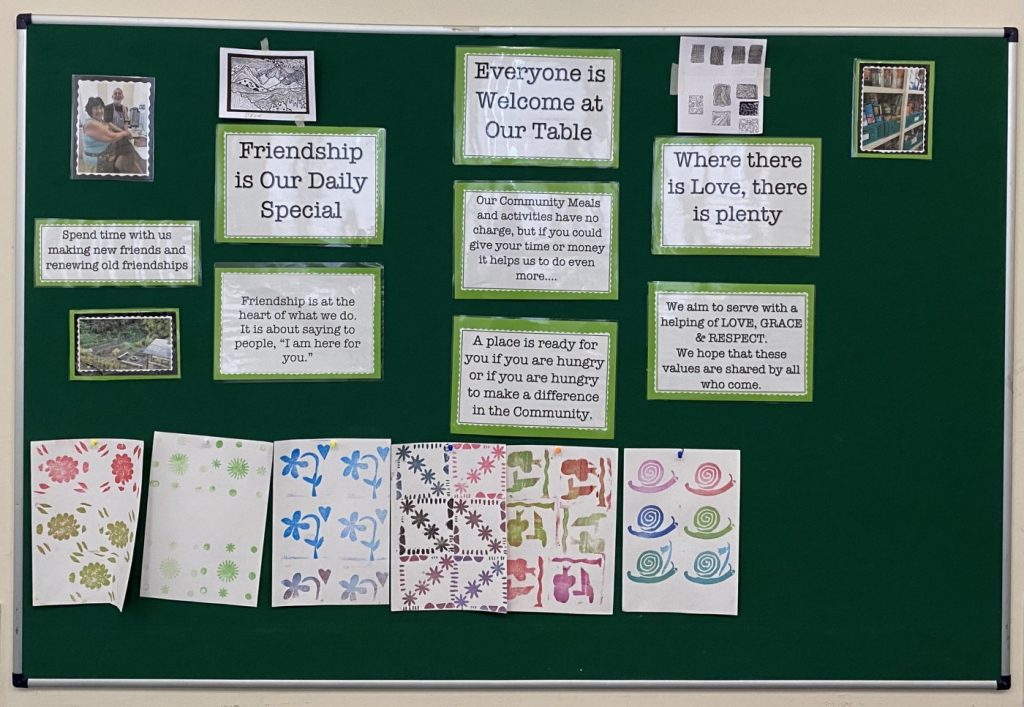
Meet Bryan...
“I have been coming here for 12 years. I like coming here because I know people, and everyone is all right with you here, and you can have a chat and a drink and a bite to eat.
“I do the community allotment as well on Wednesdays. We grow lots of veg, and share it out and what’s left we bring here. I enjoy the allotment group, because you can see from when you’ve planted the seeds right til it grows, and then harvesting.
“It’s a great feeling. You feel achievement. It’s a real wonder. I just love growing stuff. I had my own allotment, but it was too much on my own, so I joined the community allotment. I keep myself to myself, apart from with the people here, and I go to a homeless project once a week, because I have been homeless, and I have a chat and a drink and a game of pool there.
Can you tell us about Parson Cross? What’s good, what’s not so good? What does it need?
“Parson Cross needs a youth club for young people to go to. When I was younger, we had youth clubs, and when you left school if you didn’t have a job there were youth training schemes (YTS), and they were fantastic. They ought to bring things like that back, we need more support for young people.
“I want people in the election to give young people a bit of a helping hand, help them get on.”
How have things changed in the past year or so?
“When I do a bit of shopping, everything has gone up, hasn’t it? Just… everything. I got my cost of living payment today, and I am trying to save it for as long as I can.
“I wouldn’t say I live “on the breadline” but I’m on benefits, and I have to make it stretch as far as I can. It’s harder and harder.
“We need more work here. More jobs for people. There are not enough jobs, not enough secure jobs or YTSs or apprenticeships for people. It’s a vicious cycle, with a lack of opportunities, so people struggle more.”
Bryan is not alone in coming in for community as well as for the food. One of the volunteers says: “A lot of people come here looking for company. People enjoy coming here. With the meal in the evening, there are some people who need the meal and some who are financially able to support themselves but who really cherish having a meal with other people.”
Many projects cite the importance of such community. Food is sometimes what first brings people in, but it’s the sense of community that encourages people to stay. In 2023, LIFE in York interviewed dozens of people at the city’s many food projects, and found connection was one of the most valued features. Similarly, 74% of Your Local Pantry members say they feel more connected to their community, and 66% have made new friends.
I want people to show who they really are, and to make things better
Another regular at Parson Cross tells us:
“The food here is very good, but it’s also about community. I’ve been coming here since last March; I live about 20 minutes away. One of the others here introduced me to it. I come for the sandwiches and sometimes the bits of food to take away.
“Before I came here, I was on my own all the time and it’s not nice being on your own all the time. I was not eating at all because I have had problems with drinking, but this has helped me cut down.
“This is one of the best things in this community. There are a few other places like this as well, that help with loneliness and isolation.
“Parson Cross has changed a lot in my time – half for the better, half not. There is a lot of crime to sort out.
“In the election, I just want people to show who they really are and to make things better.”
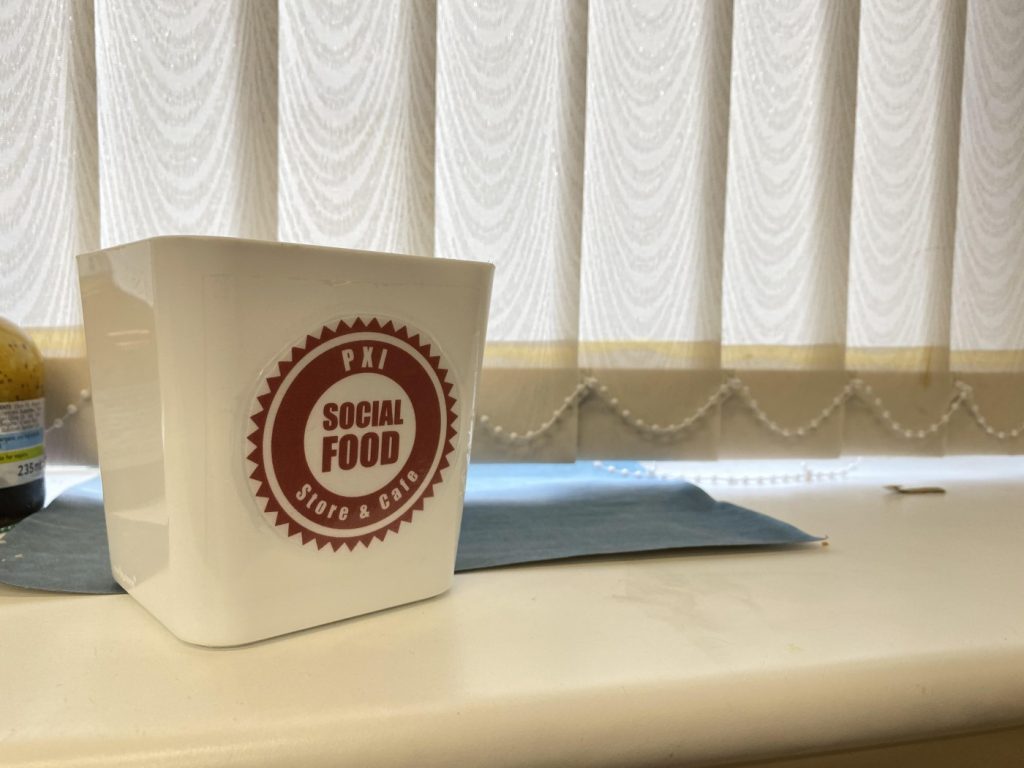
Meet Jean...
“I come here on Tuesdays and Thursdays. I come to talk to people and it puts me on the right track, listening to this lot! It stops me thinking things that I don’t want to.
“I have been coming for a few years, maybe five years. I was born and bred in Nottingham and my late husband Mel was from Huddersfield, but we lived in Sheffield so it was only an hour from each family. I’ve lived in Sheffield 27 years now.
“Sometimes I’m a bit down and feel the whole world has gone to pieces, but I come in for company and to talk to people, and I help out sometimes. I sometimes come in for the art or craft as well. And a few of them play music which is good. A couple of us go to the Wise Old Owls meetings at Hillsborough once a month as well, but we pay for that.
“The first time I came here I only stayed ten minutes, but I started coming back.
“Sheffield has its good points. It’s got a lot of places you can go for food and shopping, and it’s got the speedway, and the market is good. But it has problems too. It’s been getting harder with prices. Budgeting is harder and harder. Everything is up, and I am diabetic and have to have certain things. It’s hard.
“This place is different to others. It’s a food hub. Some places, you have to put your name down or have a referral to get food, but not here.”
The wider neighbourhood
The activities at Mt Tabor are coordinated by Parson Cross Initiative, a charity supported by the church. Nick Waterfield is pioneer minister. Here’s what he says:
Jonathan Buckley lives in the neighbourhood and is one of the charity’s trustees.
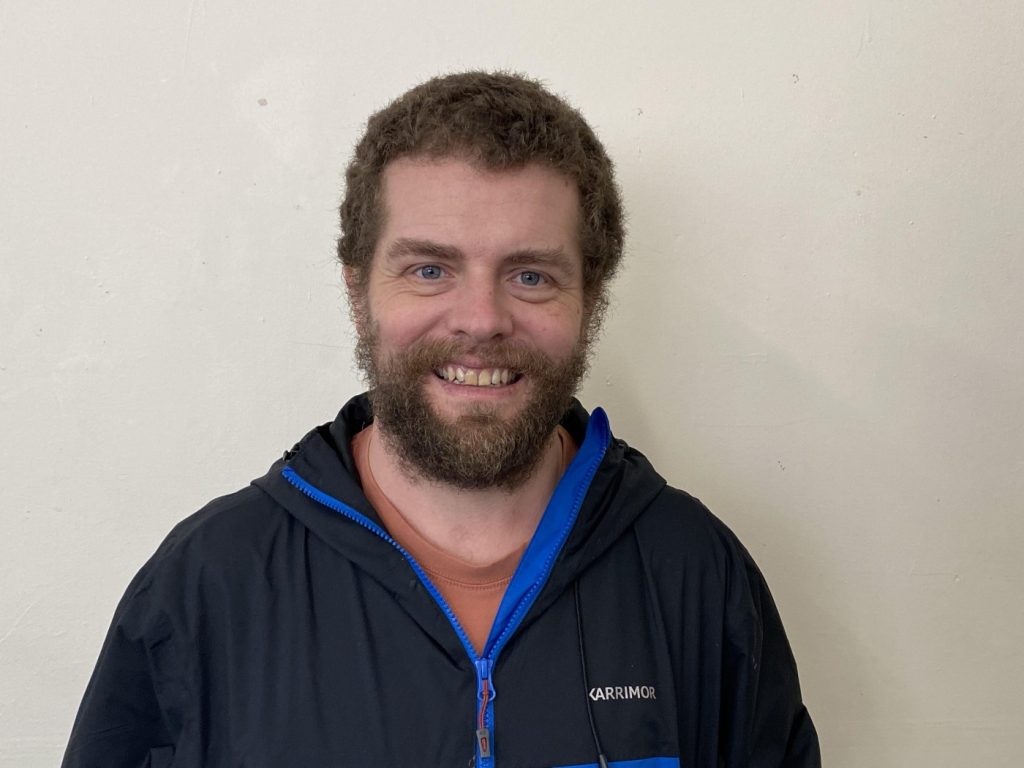
He says: “There have been issues of poverty here for 80 to 90 years. The local primary school has 60% of children on pupil premium, and the other 40% are not wealthy either. There have been new estates built, but two thirds of people are on the breadline. A lot of people here feel that to succeed means to move away, and that takes the money elsewhere.
“Increasing Universal Credit and other benefit levels would help. A lot of voluntary service stuff is hard to maintain because there are fewer volunteers than maybe 30 or 40 years ago. There was a Boys Brigade here, but it shut due to a lack of volunteers. There has been Scouts, but not much else for kids.
“For us, there is a faith motivation to act, and also wanting better for the kids. There are good news stories. People do not hear those as often, but it’s about hearing and sharing good news stories.
“There are kids here achieving great grades and doing well, but it’s so much easier for people to share negative stories. We should share the good news stories with each other.
“What I cherish here is the community, like people coming here this morning, or coming to the art group. In some ways, people’s lives do not change much, but by coming here week on week, we see the community getting stronger.
“For instance we’re doing two allotment sessions a week instead of one now, and more people are coming. And a local group of staff have said they want to do a coffee morning for us. And art students at a local school did their exhibition here. We see a lot of good community stuff.”
What issues do you want to hear being discussed in the election campaign?
“We need realistic support for people who need it. There should be a basic minimum and they shouldn’t keep cutting. They should maybe expand the trial of Universal Basic Income. They should do less scaremongering and focus on positives. It would give people more dignity and more spending money.
“Here, people spend money locally, so it would improve the local economy and support jobs. It would improve people’s livelihoods and the neighbourhood.
“The low benefit levels are a big issue for people around here. Reaching a realistic level of income is important for people. We need to see an uplift in benefit levels, and support the real Living Wage.
“I think young people need more investment in youth services focusing on places like this. In wealthier areas, people can afford to go to classes or clubs, but we need more investment in universal services for people who need it.
“So much has been cut for young people. Life needs to be more than English, maths and science. There are not enough funding for wider stuff.
“There is a need to focus more on enabling people who are creative or sporting to pursue those, rather than pushing everything into English, maths and science. There are so many kids who struggle in a formal school setting, but in a different class or a smaller setting or a one-to-one session, they fly. So we need more investment for young people.
“There is a financial cost but if we invest in schools and young people now, it reduces having to address issues and pay for other services down the line. Equip people now.”
Pushed into hardship by rising prices and inadequate support
Over lunch, four women are waiting to pick up some food. Here’s a snapshot of their conversation:
“This is my third week here. Everything is about just, managing, with everything going up, and the cost of living. I am on my own now, and because I’m on a meter I have noticed my bills have jumped again since January. It’s gone up a lot. That has taken away food money, just for trying to keep warm.
“And that’s not having it warm all the time – I am sitting just in my kitchen, the one warm room.”
“I spoke to my gas company about keeping warm, because I’m asthmatic, and if it’s cold I start coughing. They said there were food banks I should go to for support! And food banks are running out of stuff.
“I’m paying £210 a month for gas and electric from the same company.
“Food banks are good and it’s good to meet people, but they have to rely on donations.”
“I was given my notice of my job ending last October. I went through a consultation, and I was made redundant. So I went to ask how to go about claiming benefits.
“I’d never claimed benefits before and went in to ask. They said my redundancy pay was income, so I wouldn’t be eligible. When that ran out, I went back again and they said I had been given mis-information the first time, so I could put in a backdated claim. But then I was rejected because they said I should have formally applied in the October!
“Now, I owe thousands and thousands of pounds to people. We are robbing Peter to pay Paul, and then robbing Paul again to pay Peter.
“Places like this go some way to helping, but we shouldn’t have to be reliant on charity for food.
“The cost of food is going up, benefits are effectively goin down, people are losing their jobs, and everyone is falling and having to rely on things like this, because they cannot afford to live.
“What we need is for people to be able to afford food. It’s good that people support charity, but we shouldn’t be in this crisis and having to rely on it. We should be able to live in the economy.
“Even at the supermarkets, you are rationed – they say you can only buy so many of their own brand items, and if you have a big household, it’s impossible sometimes.”


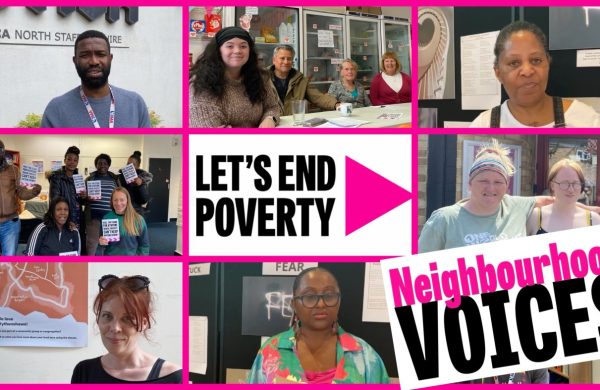
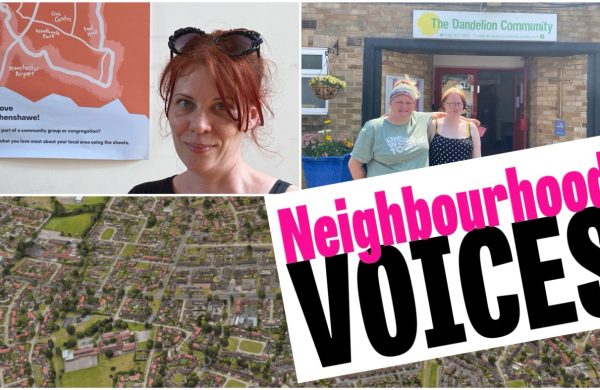
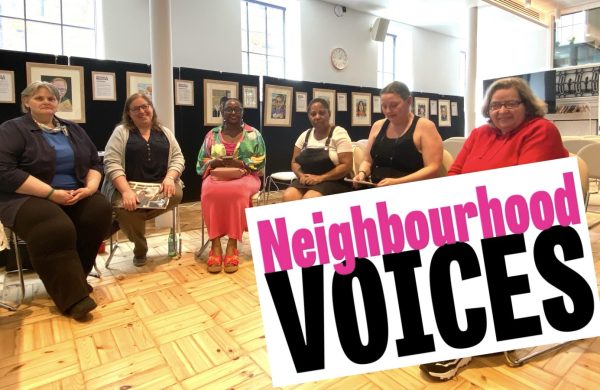
Comments (02)
Comments are closed.